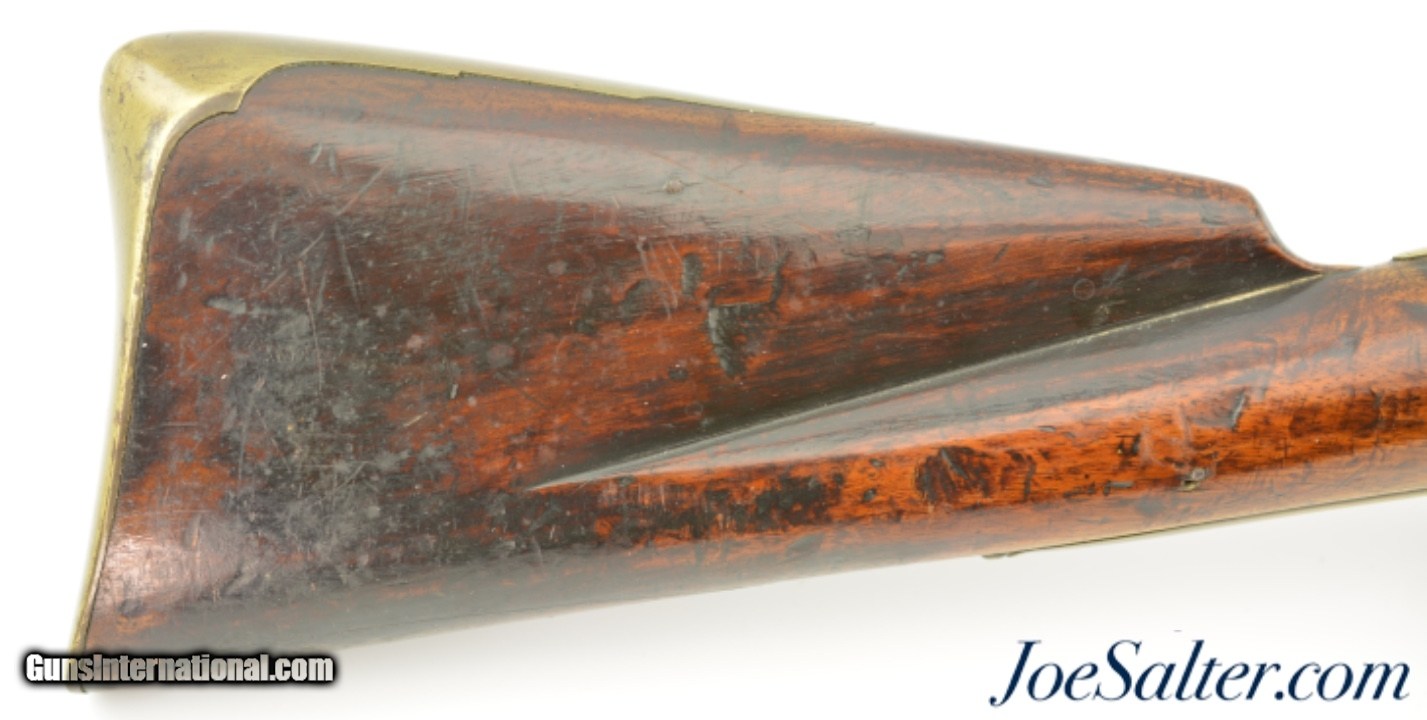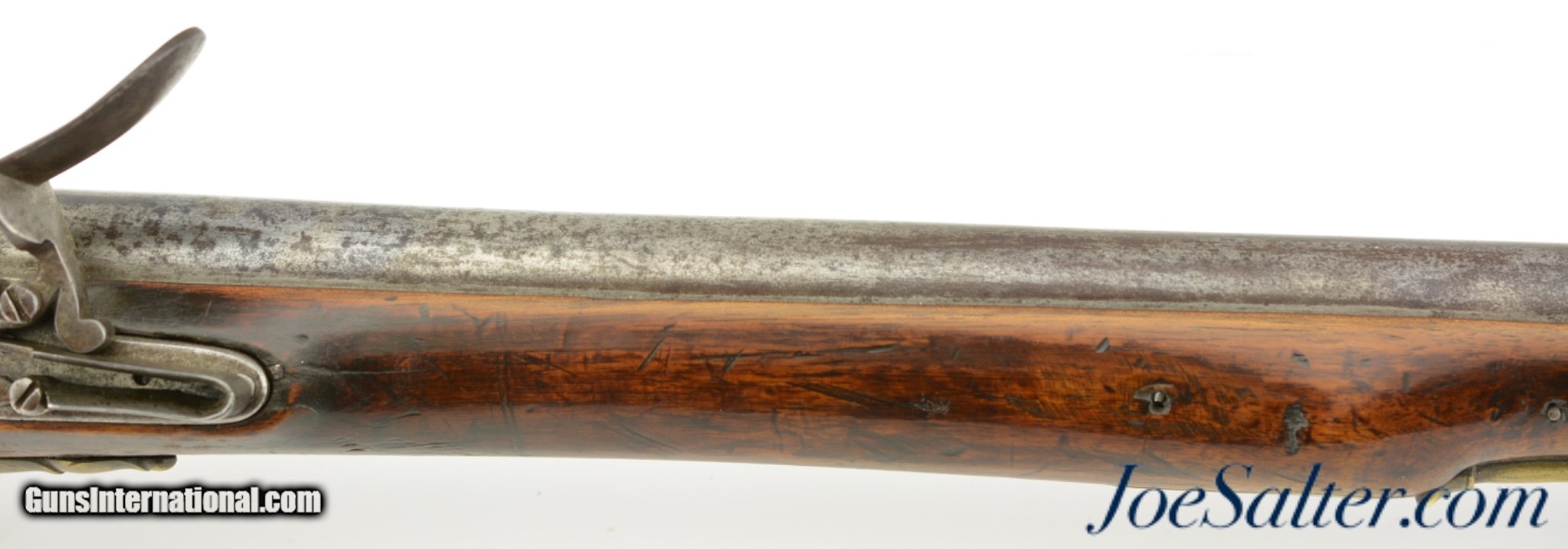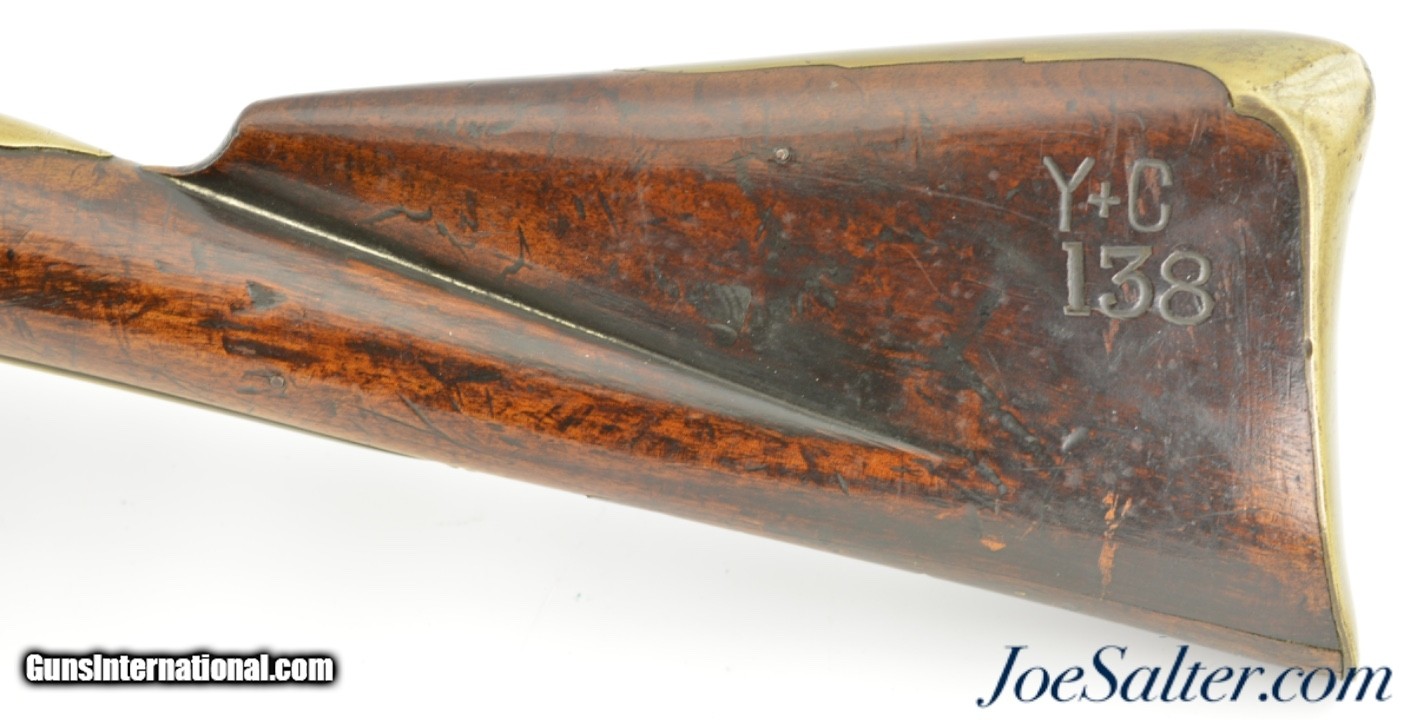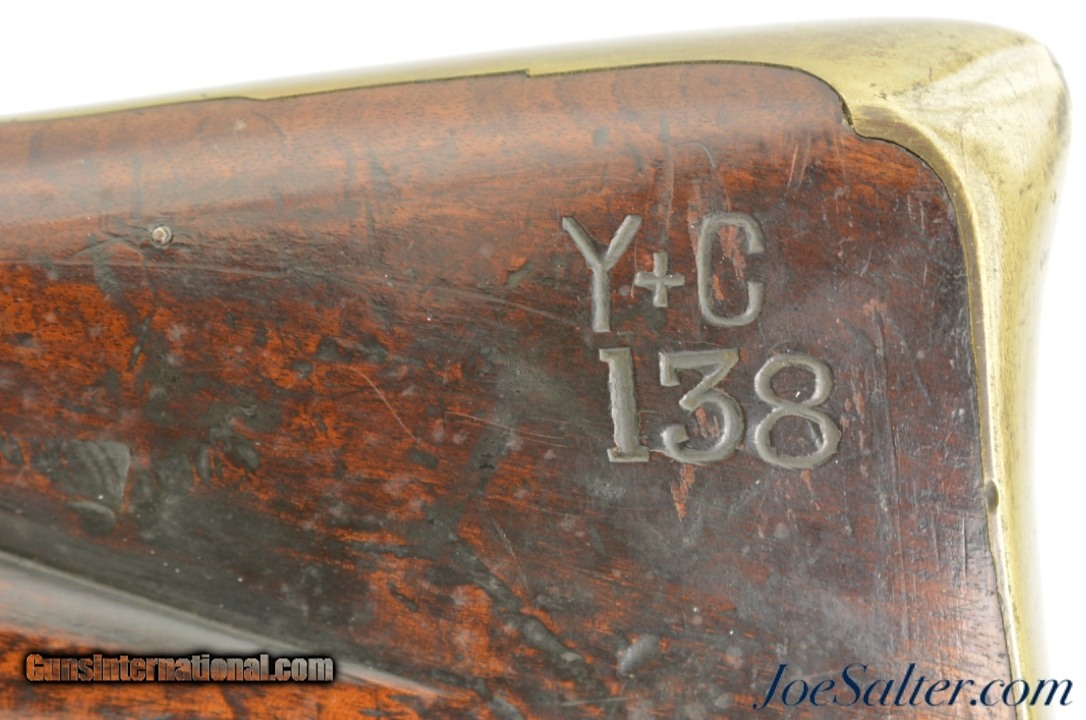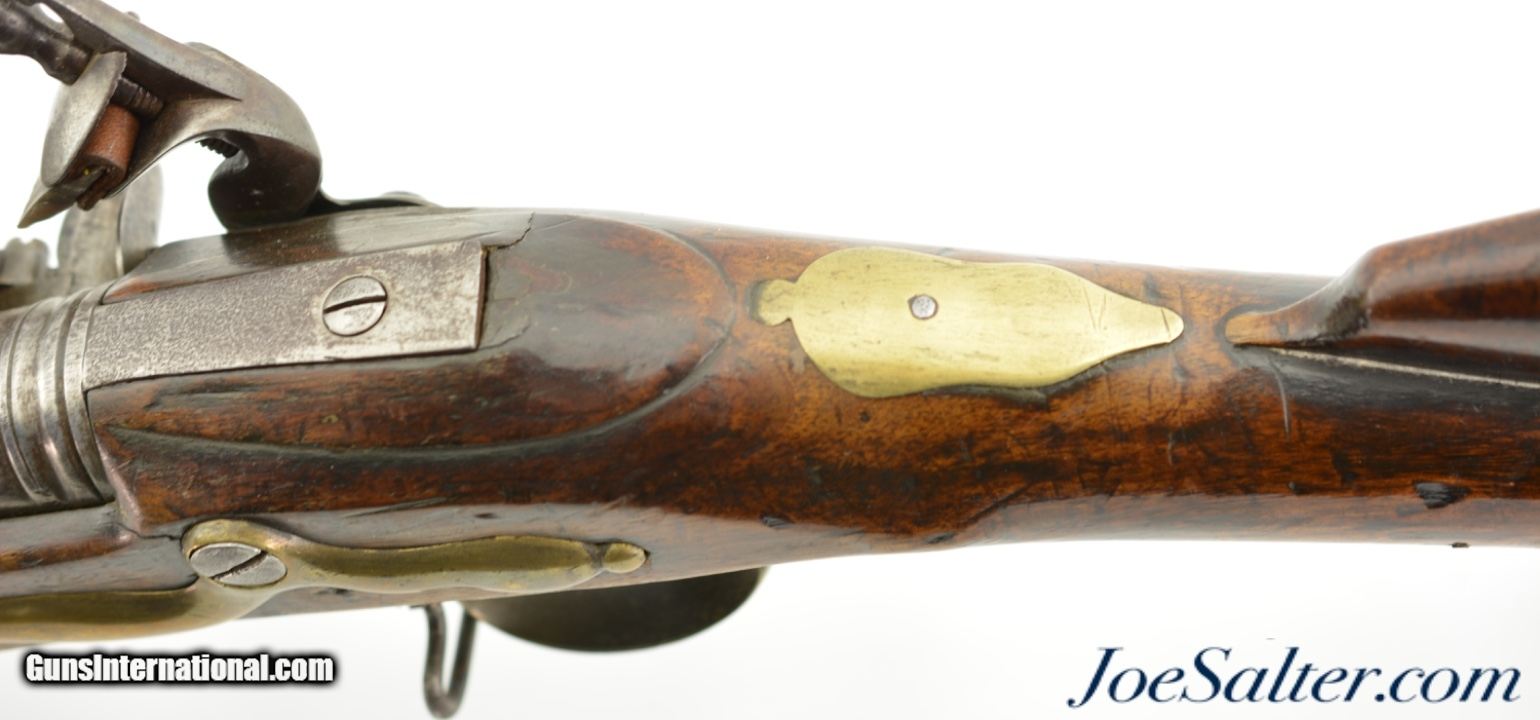Your Session is Ending
 The server has not detected any activity for the last 3 hours.
For your security, your session will expire in 2 minutes and you will be redirected to the Sign In page.
Would you like to stay signed in?
The server has not detected any activity for the last 3 hours.
For your security, your session will expire in 2 minutes and you will be redirected to the Sign In page.
Would you like to stay signed in?
1745 Jacobite Rebellion York City Militia Musket by Watkin for sale
1745 Jacobite Rebellion York City Militia Musket by Watkin for sale
Guns International #: 102911144
Seller's Inventory #: 47951
Category - Antique Rifles - Flintlock
- Military Rifles - Antique
1745 Jacobite Rebellion York City Militia Musket by Watkin
Description:
NSN, .75 Caliber, 41 7/8" barrel with a fair, pitted bore. This is one of a number of Land Pattern type muskets built by Robert Watkin of Birmingham under contract to the militia of the City of York in late 1745. The barrel and lock of this musket has an overall mottled gray patina with some areas of light-moderate pitting scattered about, and a mild yellow-ochre patina on the brass fittings. The top of the barrel has "No. 165" engraved near the breech, while the lockplate is engraved: "R / WATKIN." There are some tool marks around the touchhole, however borescope inspection of the breech reveals no evidence of welding or reconversion. The pin-fastened stock has numerous handling marks, bruises and blemishes scattered about the added oil finish, with some further small, with-the-grain cracks visible at the lockplate and sideplate. The left side of the butt has the large York Militia rack number characteristic of these muskets carved near the heel: "Y+C / 138." These muskets were furnished with brass-tipped wooden ramrods, and one is still present.; During the early stages of the 1745 Jacobite Rebellion there was a great fear that the Jacobites, led by Charles Edward Stuart, popularly known as "Bonnie Prince Charlie," would attack the City of York. The rebels had already defeated an English army at Prestonpans, and they followed this up by marching south, invading England, meeting with little opposition as far south as Derbyshire. The City of York, not much farther away, naturally became concerned. On the 24th of September, 1745, a meeting was assembled at Guildhall where the city’s defenses were discussed at length. It was concluded that they were far from sufficient, and needed to be reinforced and augmented with all possible speed. It was agreed that at least four companies of militia be raised, each consisting of a Captain, a Lieutenant, an Ensign, three Sergeants, two Corporals, one Drummer, and 60 private soldiers. The council ordered the local Constables to gather up all available guns and bring them to Guildhall where they were to be cleaned and put in good order. On November 14th, 1745 a meeting was held which included gunmaker, Robert Watkin of Birmingham and London. As a result, a contract was drawn up for Mr. Watkins to provide suitable arms at a rate of "three and twenty shillings and six pence" per musket. The contract was first filled with around 100 or so guns Watkin already had on hand with the maker's number engraved on the barrel, and Birmingham proofs (as on this example). By mid-January 1746, the "Young Pretender" had returned to Scotland and the threat of invasion became far less pressing. On 27th January, 1746 ,the city thanked the troops, stopped paying them and they reverted to their civilian lives. The guns and other stores were returned to Common Hall for storage in case of further emergency. In the interim, Watkin had constructed a large number of additional muskets under the now defunct contract, of nearly identical configuration, but with London proofs rather than Birmingham, and no York City markings on the stock. These were eventually sold and sent to Ireland. It is known that at least a few of these York City muskets made their way to North America. In fact, one example, previously exhibited by the Clarke House Museum at Princeton Battlefield State Park in New Jersey, was recently sold to a private collector. This is a splendid example of a musket with a definite connection to "The Glorious Forty-Five," and would make a wonderful addition to any collection. Antique;
Price: $9,995.00
Antique: Yes
Description:
NSN, .75 Caliber, 41 7/8" barrel with a fair, pitted bore. This is one of a number of Land Pattern type muskets built by Robert Watkin of Birmingham under contract to the militia of the City of York in late 1745. The barrel and lock of this musket has an overall mottled gray patina with some areas of light-moderate pitting scattered about, and a mild yellow-ochre patina on the brass fittings. The top of the barrel has "No. 165" engraved near the breech, while the lockplate is engraved: "R / WATKIN." There are some tool marks around the touchhole, however borescope inspection of the breech reveals no evidence of welding or reconversion. The pin-fastened stock has numerous handling marks, bruises and blemishes scattered about the added oil finish, with some further small, with-the-grain cracks visible at the lockplate and sideplate. The left side of the butt has the large York Militia rack number characteristic of these muskets carved near the heel: "Y+C / 138." These muskets were furnished with brass-tipped wooden ramrods, and one is still present.; During the early stages of the 1745 Jacobite Rebellion there was a great fear that the Jacobites, led by Charles Edward Stuart, popularly known as "Bonnie Prince Charlie," would attack the City of York. The rebels had already defeated an English army at Prestonpans, and they followed this up by marching south, invading England, meeting with little opposition as far south as Derbyshire. The City of York, not much farther away, naturally became concerned. On the 24th of September, 1745, a meeting was assembled at Guildhall where the city’s defenses were discussed at length. It was concluded that they were far from sufficient, and needed to be reinforced and augmented with all possible speed. It was agreed that at least four companies of militia be raised, each consisting of a Captain, a Lieutenant, an Ensign, three Sergeants, two Corporals, one Drummer, and 60 private soldiers. The council ordered the local Constables to gather up all available guns and bring them to Guildhall where they were to be cleaned and put in good order. On November 14th, 1745 a meeting was held which included gunmaker, Robert Watkin of Birmingham and London. As a result, a contract was drawn up for Mr. Watkins to provide suitable arms at a rate of "three and twenty shillings and six pence" per musket. The contract was first filled with around 100 or so guns Watkin already had on hand with the maker's number engraved on the barrel, and Birmingham proofs (as on this example). By mid-January 1746, the "Young Pretender" had returned to Scotland and the threat of invasion became far less pressing. On 27th January, 1746 ,the city thanked the troops, stopped paying them and they reverted to their civilian lives. The guns and other stores were returned to Common Hall for storage in case of further emergency. In the interim, Watkin had constructed a large number of additional muskets under the now defunct contract, of nearly identical configuration, but with London proofs rather than Birmingham, and no York City markings on the stock. These were eventually sold and sent to Ireland. It is known that at least a few of these York City muskets made their way to North America. In fact, one example, previously exhibited by the Clarke House Museum at Princeton Battlefield State Park in New Jersey, was recently sold to a private collector. This is a splendid example of a musket with a definite connection to "The Glorious Forty-Five," and would make a wonderful addition to any collection. Antique;
Price: $9,995.00
Antique: Yes
Contact Seller
Click Photo to Enlarge


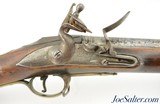




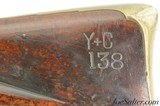






|
Guns International #: 102911144
Category - Antique Rifles - Flintlock
- Military Rifles - Antique
1745 Jacobite Rebellion York City Militia Musket by Watkin
Description: NSN, .75 Caliber, 41 7/8" barrel with a fair, pitted bore. This is one of a number of Land Pattern type muskets built by Robert Watkin of Birmingham under contract to the militia of the City of York in late 1745. The barrel and lock of this musket has an overall mottled gray patina with some areas of light-moderate pitting scattered about, and a mild yellow-ochre patina on the brass fittings. The top of the barrel has "No. 165" engraved near the breech, while the lockplate is engraved: "R / WATKIN." There are some tool marks around the touchhole, however borescope inspection of the breech reveals no evidence of welding or reconversion. The pin-fastened stock has numerous handling marks, bruises and blemishes scattered about the added oil finish, with some further small, with-the-grain cracks visible at the lockplate and sideplate. The left side of the butt has the large York Militia rack number characteristic of these muskets carved near the heel: "Y+C / 138." These muskets were furnished with brass-tipped wooden ramrods, and one is still present.; During the early stages of the 1745 Jacobite Rebellion there was a great fear that the Jacobites, led by Charles Edward Stuart, popularly known as "Bonnie Prince Charlie," would attack the City of York. The rebels had already defeated an English army at Prestonpans, and they followed this up by marching south, invading England, meeting with little opposition as far south as Derbyshire. The City of York, not much farther away, naturally became concerned. On the 24th of September, 1745, a meeting was assembled at Guildhall where the city’s defenses were discussed at length. It was concluded that they were far from sufficient, and needed to be reinforced and augmented with all possible speed. It was agreed that at least four companies of militia be raised, each consisting of a Captain, a Lieutenant, an Ensign, three Sergeants, two Corporals, one Drummer, and 60 private soldiers. The council ordered the local Constables to gather up all available guns and bring them to Guildhall where they were to be cleaned and put in good order. On November 14th, 1745 a meeting was held which included gunmaker, Robert Watkin of Birmingham and London. As a result, a contract was drawn up for Mr. Watkins to provide suitable arms at a rate of "three and twenty shillings and six pence" per musket. The contract was first filled with around 100 or so guns Watkin already had on hand with the maker's number engraved on the barrel, and Birmingham proofs (as on this example). By mid-January 1746, the "Young Pretender" had returned to Scotland and the threat of invasion became far less pressing. On 27th January, 1746 ,the city thanked the troops, stopped paying them and they reverted to their civilian lives. The guns and other stores were returned to Common Hall for storage in case of further emergency. In the interim, Watkin had constructed a large number of additional muskets under the now defunct contract, of nearly identical configuration, but with London proofs rather than Birmingham, and no York City markings on the stock. These were eventually sold and sent to Ireland. It is known that at least a few of these York City muskets made their way to North America. In fact, one example, previously exhibited by the Clarke House Museum at Princeton Battlefield State Park in New Jersey, was recently sold to a private collector. This is a splendid example of a musket with a definite connection to "The Glorious Forty-Five," and would make a wonderful addition to any collection. Antique; Price: $9,995.00 Antique: Yes Contact Seller |
Guns International #: 102911144
Seller's Inventory #: 47951
Category - Antique Rifles - Flintlock
- Military Rifles - Antique
1745 Jacobite Rebellion York City Militia Musket by Watkin
Description:
NSN, .75 Caliber, 41 7/8" barrel with a fair, pitted bore. This is one of a number of Land Pattern type muskets built by Robert Watkin of Birmingham under contract to the militia of the City of York in late 1745. The barrel and lock of this musket has an overall mottled gray patina with some areas of light-moderate pitting scattered about, and a mild yellow-ochre patina on the brass fittings. The top of the barrel has "No. 165" engraved near the breech, while the lockplate is engraved: "R / WATKIN." There are some tool marks around the touchhole, however borescope inspection of the breech reveals no evidence of welding or reconversion. The pin-fastened stock has numerous handling marks, bruises and blemishes scattered about the added oil finish, with some further small, with-the-grain cracks visible at the lockplate and sideplate. The left side of the butt has the large York Militia rack number characteristic of these muskets carved near the heel: "Y+C / 138." These muskets were furnished with brass-tipped wooden ramrods, and one is still present.; During the early stages of the 1745 Jacobite Rebellion there was a great fear that the Jacobites, led by Charles Edward Stuart, popularly known as "Bonnie Prince Charlie," would attack the City of York. The rebels had already defeated an English army at Prestonpans, and they followed this up by marching south, invading England, meeting with little opposition as far south as Derbyshire. The City of York, not much farther away, naturally became concerned. On the 24th of September, 1745, a meeting was assembled at Guildhall where the city’s defenses were discussed at length. It was concluded that they were far from sufficient, and needed to be reinforced and augmented with all possible speed. It was agreed that at least four companies of militia be raised, each consisting of a Captain, a Lieutenant, an Ensign, three Sergeants, two Corporals, one Drummer, and 60 private soldiers. The council ordered the local Constables to gather up all available guns and bring them to Guildhall where they were to be cleaned and put in good order. On November 14th, 1745 a meeting was held which included gunmaker, Robert Watkin of Birmingham and London. As a result, a contract was drawn up for Mr. Watkins to provide suitable arms at a rate of "three and twenty shillings and six pence" per musket. The contract was first filled with around 100 or so guns Watkin already had on hand with the maker's number engraved on the barrel, and Birmingham proofs (as on this example). By mid-January 1746, the "Young Pretender" had returned to Scotland and the threat of invasion became far less pressing. On 27th January, 1746 ,the city thanked the troops, stopped paying them and they reverted to their civilian lives. The guns and other stores were returned to Common Hall for storage in case of further emergency. In the interim, Watkin had constructed a large number of additional muskets under the now defunct contract, of nearly identical configuration, but with London proofs rather than Birmingham, and no York City markings on the stock. These were eventually sold and sent to Ireland. It is known that at least a few of these York City muskets made their way to North America. In fact, one example, previously exhibited by the Clarke House Museum at Princeton Battlefield State Park in New Jersey, was recently sold to a private collector. This is a splendid example of a musket with a definite connection to "The Glorious Forty-Five," and would make a wonderful addition to any collection. Antique;
Price: $9,995.00
Antique: Yes
Description:
NSN, .75 Caliber, 41 7/8" barrel with a fair, pitted bore. This is one of a number of Land Pattern type muskets built by Robert Watkin of Birmingham under contract to the militia of the City of York in late 1745. The barrel and lock of this musket has an overall mottled gray patina with some areas of light-moderate pitting scattered about, and a mild yellow-ochre patina on the brass fittings. The top of the barrel has "No. 165" engraved near the breech, while the lockplate is engraved: "R / WATKIN." There are some tool marks around the touchhole, however borescope inspection of the breech reveals no evidence of welding or reconversion. The pin-fastened stock has numerous handling marks, bruises and blemishes scattered about the added oil finish, with some further small, with-the-grain cracks visible at the lockplate and sideplate. The left side of the butt has the large York Militia rack number characteristic of these muskets carved near the heel: "Y+C / 138." These muskets were furnished with brass-tipped wooden ramrods, and one is still present.; During the early stages of the 1745 Jacobite Rebellion there was a great fear that the Jacobites, led by Charles Edward Stuart, popularly known as "Bonnie Prince Charlie," would attack the City of York. The rebels had already defeated an English army at Prestonpans, and they followed this up by marching south, invading England, meeting with little opposition as far south as Derbyshire. The City of York, not much farther away, naturally became concerned. On the 24th of September, 1745, a meeting was assembled at Guildhall where the city’s defenses were discussed at length. It was concluded that they were far from sufficient, and needed to be reinforced and augmented with all possible speed. It was agreed that at least four companies of militia be raised, each consisting of a Captain, a Lieutenant, an Ensign, three Sergeants, two Corporals, one Drummer, and 60 private soldiers. The council ordered the local Constables to gather up all available guns and bring them to Guildhall where they were to be cleaned and put in good order. On November 14th, 1745 a meeting was held which included gunmaker, Robert Watkin of Birmingham and London. As a result, a contract was drawn up for Mr. Watkins to provide suitable arms at a rate of "three and twenty shillings and six pence" per musket. The contract was first filled with around 100 or so guns Watkin already had on hand with the maker's number engraved on the barrel, and Birmingham proofs (as on this example). By mid-January 1746, the "Young Pretender" had returned to Scotland and the threat of invasion became far less pressing. On 27th January, 1746 ,the city thanked the troops, stopped paying them and they reverted to their civilian lives. The guns and other stores were returned to Common Hall for storage in case of further emergency. In the interim, Watkin had constructed a large number of additional muskets under the now defunct contract, of nearly identical configuration, but with London proofs rather than Birmingham, and no York City markings on the stock. These were eventually sold and sent to Ireland. It is known that at least a few of these York City muskets made their way to North America. In fact, one example, previously exhibited by the Clarke House Museum at Princeton Battlefield State Park in New Jersey, was recently sold to a private collector. This is a splendid example of a musket with a definite connection to "The Glorious Forty-Five," and would make a wonderful addition to any collection. Antique;
Price: $9,995.00
Antique: Yes
Guns International #: 102911144
Seller's Inventory #: 47951


Guns International #: 102911144
Seller's Inventory #: 47951
Category - Antique Rifles - Flintlock
- Military Rifles - Antique
1745 Jacobite Rebellion York City Militia Musket by Watkin
Description:
NSN, .75 Caliber, 41 7/8" barrel with a fair, pitted bore. This is one of a number of Land Pattern type muskets built by Robert Watkin of Birmingham under contract to the militia of the City of York in late 1745. The barrel and lock of this musket has an overall mottled gray patina with some areas of light-moderate pitting scattered about, and a mild yellow-ochre patina on the brass fittings. The top of the barrel has "No. 165" engraved near the breech, while the lockplate is engraved: "R / WATKIN." There are some tool marks around the touchhole, however borescope inspection of the breech reveals no evidence of welding or reconversion. The pin-fastened stock has numerous handling marks, bruises and blemishes scattered about the added oil finish, with some further small, with-the-grain cracks visible at the lockplate and sideplate. The left side of the butt has the large York Militia rack number characteristic of these muskets carved near the heel: "Y+C / 138." These muskets were furnished with brass-tipped wooden ramrods, and one is still present.; During the early stages of the 1745 Jacobite Rebellion there was a great fear that the Jacobites, led by Charles Edward Stuart, popularly known as "Bonnie Prince Charlie," would attack the City of York. The rebels had already defeated an English army at Prestonpans, and they followed this up by marching south, invading England, meeting with little opposition as far south as Derbyshire. The City of York, not much farther away, naturally became concerned. On the 24th of September, 1745, a meeting was assembled at Guildhall where the city’s defenses were discussed at length. It was concluded that they were far from sufficient, and needed to be reinforced and augmented with all possible speed. It was agreed that at least four companies of militia be raised, each consisting of a Captain, a Lieutenant, an Ensign, three Sergeants, two Corporals, one Drummer, and 60 private soldiers. The council ordered the local Constables to gather up all available guns and bring them to Guildhall where they were to be cleaned and put in good order. On November 14th, 1745 a meeting was held which included gunmaker, Robert Watkin of Birmingham and London. As a result, a contract was drawn up for Mr. Watkins to provide suitable arms at a rate of "three and twenty shillings and six pence" per musket. The contract was first filled with around 100 or so guns Watkin already had on hand with the maker's number engraved on the barrel, and Birmingham proofs (as on this example). By mid-January 1746, the "Young Pretender" had returned to Scotland and the threat of invasion became far less pressing. On 27th January, 1746 ,the city thanked the troops, stopped paying them and they reverted to their civilian lives. The guns and other stores were returned to Common Hall for storage in case of further emergency. In the interim, Watkin had constructed a large number of additional muskets under the now defunct contract, of nearly identical configuration, but with London proofs rather than Birmingham, and no York City markings on the stock. These were eventually sold and sent to Ireland. It is known that at least a few of these York City muskets made their way to North America. In fact, one example, previously exhibited by the Clarke House Museum at Princeton Battlefield State Park in New Jersey, was recently sold to a private collector. This is a splendid example of a musket with a definite connection to "The Glorious Forty-Five," and would make a wonderful addition to any collection. Antique;
Price: $9,995.00
Antique: Yes
Description:
NSN, .75 Caliber, 41 7/8" barrel with a fair, pitted bore. This is one of a number of Land Pattern type muskets built by Robert Watkin of Birmingham under contract to the militia of the City of York in late 1745. The barrel and lock of this musket has an overall mottled gray patina with some areas of light-moderate pitting scattered about, and a mild yellow-ochre patina on the brass fittings. The top of the barrel has "No. 165" engraved near the breech, while the lockplate is engraved: "R / WATKIN." There are some tool marks around the touchhole, however borescope inspection of the breech reveals no evidence of welding or reconversion. The pin-fastened stock has numerous handling marks, bruises and blemishes scattered about the added oil finish, with some further small, with-the-grain cracks visible at the lockplate and sideplate. The left side of the butt has the large York Militia rack number characteristic of these muskets carved near the heel: "Y+C / 138." These muskets were furnished with brass-tipped wooden ramrods, and one is still present.; During the early stages of the 1745 Jacobite Rebellion there was a great fear that the Jacobites, led by Charles Edward Stuart, popularly known as "Bonnie Prince Charlie," would attack the City of York. The rebels had already defeated an English army at Prestonpans, and they followed this up by marching south, invading England, meeting with little opposition as far south as Derbyshire. The City of York, not much farther away, naturally became concerned. On the 24th of September, 1745, a meeting was assembled at Guildhall where the city’s defenses were discussed at length. It was concluded that they were far from sufficient, and needed to be reinforced and augmented with all possible speed. It was agreed that at least four companies of militia be raised, each consisting of a Captain, a Lieutenant, an Ensign, three Sergeants, two Corporals, one Drummer, and 60 private soldiers. The council ordered the local Constables to gather up all available guns and bring them to Guildhall where they were to be cleaned and put in good order. On November 14th, 1745 a meeting was held which included gunmaker, Robert Watkin of Birmingham and London. As a result, a contract was drawn up for Mr. Watkins to provide suitable arms at a rate of "three and twenty shillings and six pence" per musket. The contract was first filled with around 100 or so guns Watkin already had on hand with the maker's number engraved on the barrel, and Birmingham proofs (as on this example). By mid-January 1746, the "Young Pretender" had returned to Scotland and the threat of invasion became far less pressing. On 27th January, 1746 ,the city thanked the troops, stopped paying them and they reverted to their civilian lives. The guns and other stores were returned to Common Hall for storage in case of further emergency. In the interim, Watkin had constructed a large number of additional muskets under the now defunct contract, of nearly identical configuration, but with London proofs rather than Birmingham, and no York City markings on the stock. These were eventually sold and sent to Ireland. It is known that at least a few of these York City muskets made their way to North America. In fact, one example, previously exhibited by the Clarke House Museum at Princeton Battlefield State Park in New Jersey, was recently sold to a private collector. This is a splendid example of a musket with a definite connection to "The Glorious Forty-Five," and would make a wonderful addition to any collection. Antique;
Price: $9,995.00
Antique: Yes
Contact Seller
Buy Now
Guns International Advertising Policy
GunsInternational.com is the #1 Gun Classified website that brings gun buyers and gun brokers or sellers together through classifed advertising of guns, gun related items and services for sale online. If you are looking to buy guns or sell guns, you have come to the right place. GunsInternational.com gun classifieds currently have over 100,000 guns for sale online by numerous dealers and collectors alike. Guns International makes no representation or warranty as to the accuracy of the information contained in the gun classifieds, gun parts or gun services classifieds listings. Buyers and sellers are required to know and comply with all applicable local, state, federal and international firearm laws.
GunsInternational.com is the #1 Gun Classified website that brings gun buyers and gun brokers or sellers together through classifed advertising of guns, gun related items and services for sale online. If you are looking to buy guns or sell guns, you have come to the right place. GunsInternational.com gun classifieds currently have over 100,000 guns for sale online by numerous dealers and collectors alike. Guns International makes no representation or warranty as to the accuracy of the information contained in the gun classifieds, gun parts or gun services classifieds listings. Buyers and sellers are required to know and comply with all applicable local, state, federal and international firearm laws.
Listings
Home
New Today
New This Week
Rifles For Sale Online
Shotguns For Sale Online
Handguns For Sale Online
Pistols For Sale Online
Revolvers For Sale Online
NFA
Gun Parts For Sale Online
Services
Home
New Today
New This Week
Rifles For Sale Online
Shotguns For Sale Online
Handguns For Sale Online
Pistols For Sale Online
Revolvers For Sale Online
NFA
Gun Parts For Sale Online
Services
©2006 - 2024 all rights reserved. | Guns International.com | V4.1 ww3



Privacy Policy
User Agreement
FAQs
Contact Us
©2006 - 2024 all rights reserved.
Guns International.com | V4.1 ww3
Guns International.com | V4.1 ww3



